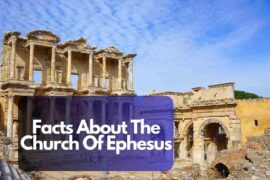The Church of Ephesus held a special place among the seven churches mentioned in the book of Revelation, penned by the apostle John. Under the influence of the apostle Paul, who spent significant time nurturing and guiding this congregation, the Ephesian Church thrived and flourished in its early years. Yet, despite its initial vitality, the Church of Ephesus encountered a series of issues and obstacles that led to its decline and an eventual loss of its commendable spiritual fervor.
This article aims to shed light on the specific challenges faced by the Church of Ephesus during its existence and seeks to answer the question: What was the problem with the Church of Ephesus? By examining biblical accounts, historical records, and scholarly interpretations, we will unravel the multifaceted issues that plagued this early Christian community.
Contents
What Was The Problem With The Church Of Ephesus?
The Church of Ephesus was one of the prominent early Christian communities, located in the ancient city of Ephesus, which was situated in what is now modern-day Turkey. Ephesus was a significant city in the Roman Empire and served as a major center of commerce, culture, and religion. The church in Ephesus played a crucial role in the spread of Christianity in the region.
The church was founded by the apostle Paul during his missionary journey to Ephesus in the first century AD. Paul spent approximately three years in Ephesus, teaching and establishing a strong Christian community. The Ephesian believers were known for their zeal, commitment to the faith, and active participation in the ministry.
Mention of the problem that arose within the church
However, despite the commendable qualities of the Church of Ephesus, it faced a specific problem that is addressed in the New Testament. The problem that arose within the church was a decline in their fervent love and devotion to Christ. This is highlighted in the letter written by the apostle John to the church, known as the Book of Revelation.
In the Book of Revelation, which contains a series of messages to seven churches, the church in Ephesus receives a stern rebuke from Jesus Christ. In Revelation 2:4, Jesus says, “But I have this against you, that you have abandoned the love you had at first.”
The church had become so focused on maintaining correct doctrine and preserving the purity of the faith that they neglected their initial passion and love for Christ. This decline in love for Christ had serious implications for the spiritual vitality and effectiveness of the church in fulfilling its mission.
The problem of waning love in the Church of Ephesus serves as a warning and a call to examine the priorities and motivations of believers in their relationship with Christ. It reminds us that genuine faith must be accompanied by a vibrant and enduring love for God and others.
Historical Context of the Church of Ephesus
Background information on the city of Ephesus
Ephesus was an ancient city located on the western coast of Asia Minor (modern-day Turkey). It was a prosperous and influential city, serving as a hub for trade and commerce in the region. Ephesus was renowned for its magnificent architecture, including the Temple of Artemis, one of the Seven Wonders of the Ancient World. The city was also known for its rich cultural and religious traditions, with various deities being worshiped there.
Establishment and early growth of the Church of Ephesus
The Church of Ephesus was established by the apostle Paul during his third missionary journey, which took place around 52-55 AD. Paul arrived in Ephesus and began preaching the gospel, reasoning with both Jews and Gentiles in the local synagogue. The response was significant, and many people came to faith in Christ.
Paul’s ministry in Ephesus lasted for about three years, during which he taught extensively and performed miracles that validated the message of Christ. The impact of Paul’s ministry was so profound that it influenced not only the city but also the surrounding regions.
Importance of Ephesus as a center of early Christianity
Ephesus held a strategic position in the spread of Christianity during the early days of the church. The city’s geographical location, coupled with its cultural and commercial significance, made it a vital center for the proclamation of the gospel. As a result, the Church of Ephesus played a pivotal role in the growth and expansion of the Christian faith.
Moreover, Ephesus served as a hub for communication and interaction among various early Christian communities. It became a significant base for Paul’s missionary activities, from where he sent out letters to other churches, including the well-known Letter to the Ephesians. The prominence of Ephesus as a center of early Christianity elevated its importance and influence within the early Christian world.
The Church of Ephesus in the New Testament
Overview of the Letter to the Ephesians written by the Apostle Paul
The letter to the Ephesians, authored by the apostle Paul, is one of the New Testament epistles. It is a letter addressed not only to the church in Ephesus but also to the surrounding churches in the region. The letter emphasizes the themes of unity, grace, and the mystery of Christ, offering practical instructions for Christian living and emphasizing the significance of the church as the body of Christ.
Praise for the church’s positive aspects and achievements
In the letter to the Ephesians, Paul commends the church for their faith in Christ and their love for the saints. He acknowledges their perseverance in the face of trials and their efforts to maintain doctrinal purity. Paul also highlights their zeal for good works and their commitment to living out the Christian faith.
Identification of the problem that emerged within the church
However, despite the church’s commendable qualities, Paul addresses the problem of their waning love for Christ. In Revelation 2:4, it is mentioned that the Ephesian church had abandoned the love they had at first. While the specific details of the problem are not elaborated upon in the letter, it is evident that the church had become more focused on doctrinal correctness and external works, neglecting the fervent love and devotion to Christ that they initially possessed.
This decline in love for Christ was a serious issue, as it affected the church’s relationship with God and its ability to effectively represent Him to the world. The problem serves as a warning and a call to rekindle their love for Christ and prioritize their relationship with Him above all else.
The Problem with the Church of Ephesus
Description of the problem and its manifestation
The problem in the Church of Ephesus was a decline in their fervent love and devotion to Christ. While the specific manifestations of this problem are not explicitly mentioned in the letter to the Ephesians, it is implied that their love for Christ had diminished, resulting in a lack of passion, zeal, and intimacy in their relationship with Him. They were going through the motions of practicing their faith but had lost the genuine affection and devotion they once had.
Analysis of the causes and contributing factors
There are several possible causes and contributing factors to the decline in love within the Church of Ephesus. It is likely that over time, they became focused on external works and maintaining doctrinal purity to the detriment of their personal relationship with Christ. They may have become more legalistic, emphasizing rules and regulations rather than experiencing a vibrant and personal connection with Jesus.
Furthermore, the pressures of living in a society steeped in idolatry and pagan practices could have influenced their priorities and led them to compromise their love for Christ. The cultural and social context may have created challenges and distractions that gradually eroded their devotion.
Examination of the consequences of the problem
The consequences of the declining love within the Church of Ephesus were significant. First and foremost, their relationship with Christ suffered. They missed out on the joy, intimacy, and spiritual growth that come from a deep love for Him. This affected their ability to experience the fullness of God’s grace and to be transformed into His likeness.
The decline in love also had implications for their effectiveness in fulfilling their mission as a church. Love for Christ is the foundation for loving and serving others. Without genuine love, their acts of service and ministry would become empty and lacking in true compassion. Their witness to the world would be diminished, and their impact on the surrounding community would be weakened.
The Letter to the Ephesians: Solutions and Instructions
Overview of the contents of the letter
The letter to the Ephesians contains a wealth of theological and practical instructions for the church. It emphasizes the unity of believers in Christ, the grace of God, and the mystery of the gospel. Paul addresses various aspects of Christian living, including relationships, spiritual growth, and the armor of God. The letter also highlights the importance of love and the transformative power of the Holy Spirit.
Exposition of the solutions and instructions provided by Paul
Within the letter, Paul offers solutions and instructions to address the problem of waning love. He encourages the church to remember their first love and to repent from their lack of devotion. He calls them to renew their commitment to Christ and to seek a deep, intimate relationship with Him. Paul emphasizes the centrality of Christ, urging believers to be rooted and grounded in His love.
Discussion of the significance of the instructions for the church
The instructions given by Paul in the letter to the Ephesians hold great significance for the church not only in Ephesus but also for believers throughout history. They remind us of the essential role that love plays in our relationship with Christ and in our interactions with others. The call to cultivate a fervent love for Christ and to live out that love in our daily lives remains relevant and vital for every believer.
The instructions in Ephesians challenge us to examine our priorities, guard against complacency, and pursue a deep and authentic love for Christ. They provide a roadmap for spiritual growth and maturity, guiding us in our relationships with fellow believers and empowering us to impact the world with the transformative power of God’s love.
Lessons and Applications
Examination of the lessons that can be learned from the problem in Ephesus
1. Love as the foundation: The Church of Ephesus teaches us that love for Christ is the foundation of our faith. It is not enough to focus solely on doctrine or external works; a genuine and passionate love for Christ is essential.
2. Beware of complacency: The decline in love within the Church of Ephesus warns us against complacency in our spiritual lives. We must continually guard against becoming lukewarm or losing our fervor for Christ.
3. Balance between truth and love: The Ephesian church’s emphasis on doctrinal purity at the expense of love teaches us the importance of maintaining a healthy balance between truth and love. Both are essential and should be held in tension.
Discussion of the relevance of the problem and its solutions for modern-day churches
1. Avoiding legalism and religious performance: Just like the Church of Ephesus, modern-day churches can easily fall into the trap of legalism and religious performance. We must guard against relying solely on outward appearances and prioritize cultivating a deep love for Christ.
2. Balancing doctrine and love: Churches today should strive for a balance between sound doctrine and fervent love for Christ. We need both a solid understanding of biblical truths and an authentic love that impacts our relationships and actions.
3. The power of the Holy Spirit: The solutions provided in the letter to the Ephesians remind us of the importance of relying on the Holy Spirit for spiritual transformation. Churches should continually seek the infilling and empowerment of the Spirit to cultivate love and unity.
Application of the lessons to individual believers and their spiritual growth
1. Personal devotion: The lessons from Ephesus call individuals to examine their personal devotion to Christ. We should evaluate our love for Him and seek to deepen our relationship through prayer, Bible study, worship, and intimacy with the Holy Spirit.
2. Prioritizing love: Applying the lessons from Ephesus requires us to prioritize love in our relationships with fellow believers and the world. We should practice forgiveness, demonstrate compassion, and selflessly serve others.
3. Continuous renewal: Just as the Church of Ephesus was called to repent and renew their love, individual believers should engage in ongoing self-reflection and repentance. We must guard against complacency and constantly seek renewal in our love for Christ.
Conclusion
The Church of Ephesus faced a problem of declining love for Christ, resulting in a loss of fervor and passion.
The letter to the Ephesians provides solutions by calling the church to repentance, renewing their love for Christ, and offering practical instructions on living out their faith in love and unity.
The experience of the Church of Ephesus serves as a timeless reminder of the importance of love, balance, and spiritual renewal in the life of the Church. The lessons learned from Ephesus continue to hold significant relevance for modern-day churches and individual believers in their pursuit of a vibrant and authentic faith.








